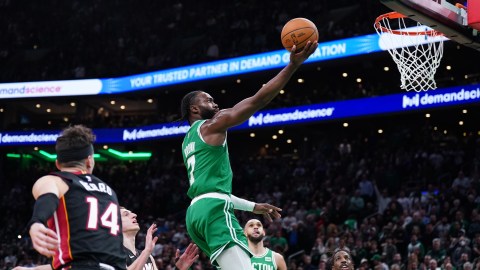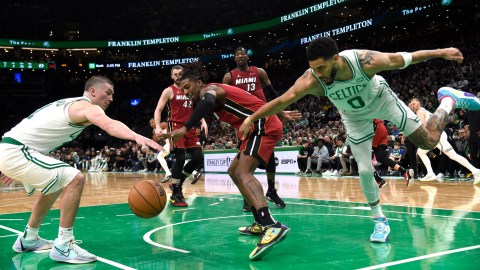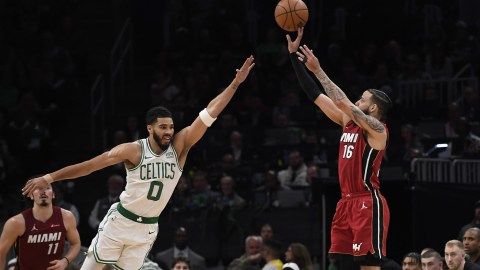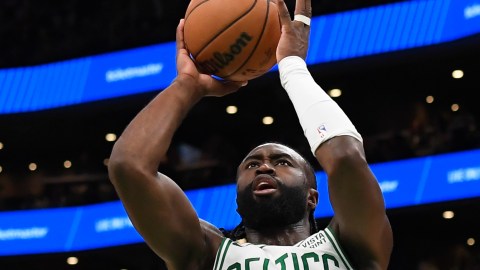Let’s get hypothetical for a moment and assume the Boston Celtics’ brass are either lying or mistaken about the extent of Kevin Garnett’s injury.
It’s not that far-fetched. Flash back to Feb. 19, 2009, when KG suffered a devastating injury to that same right leg (on an eerily similar play) against the Utah Jazz. The word after the game? Not to worry. Just a strained right leg. Should be back on the court in two weeks.
KG sat out the next 13 games, watching the Celtics dive-bomb to a 7-6 record over that span, and returned for four painful-to-watch tilts in March before hanging ’em up for the rest of the season. Eventually, he underwent surgery to remove bone spurs in that knee.
Back to the present. Garnett, after keeling over in pain on the court Wednesday night and grasping his right knee, has been diagnosed with a strained right calf. Not to worry. He should be back in two weeks. Right?
Now I know the comparison is a bit unfair. And, given that we’re not the well-educated trainers personally examining Kevin Garnett’s immensely important right leg, we have to take the Celtics’ front office at their word (though, as Patriots head coach Bill Belichick has made amply apparent, teams have every right and motive to give the press the run-around with injury news).
But the hypothetical is worthwhile to this extent — It forces Boston’s coaches and fans to consider just how far this team can go without its defensive captain.
This week, with matchups scheduled against the Western Conference’s current No. 1 seed San Antonio Spurs (Wednesday) and the Chicago Bulls (Saturday), currently third in the East, is a good test.
San Antonio (29-4) looks like a juggernaut in the West. Add a maturing DeJuan Blair and a much more comfortable Richard Jefferson to the veteran triad of Tim Duncan, Manu Ginobili and Tony Parker, and it’s no wonder they’re rolling over their competition, sitting second in the league in point differential.
For a KG-less Boston, the particular hurdle will be San Antonio’s frontcourt offense. The Spurs dropped 60 points in the paint against Oklahoma City on Saturday. Against the Los Angeles Lakers several nights before? Forty-two points down low.
Without Garnett, it will be very difficult to put a stop to that outpouring. Preventing penetration from the wing will be pivotal.
At Chicago (22-10), Boston will be up against youthful speed (of which they possess very little) and aggressive rebounding. In their two wins over the Bulls earlier this season, the Celtics relied heavily on Garnett, who averaged a ridiculous 18 points, 14 boards, five assists and three steals.
But there is also no doubt that Boston holds certain advantages that it didn’t in the 2008-09 season.
Improved frontcourt
Yes, some of them are old and banged up, but the 2011 Celtics own five legitimate big men (not including KG): Shaquille O’Neal, Jermaine O’Neal, Glen Davis, Semih Erden (worth much more than a 60th pick in the draft) and Kendrick Perkins, who’s due back in February.
The 2009 squad? Perk, a much younger, less developed Big Baby, Leon Powe and Mikki Moore.
Makes the loss of KG seem a little less dire, doesn’t it?
Improved bench
That 2009 bunch also lacked depth at point guard (love Eddie House, but he’s not a ball-handler, and Stephon Marbury is, well, Stephon Marbury) and small forward. When healthy, this year’s bench has almost too many options — Nate Robinson and Avery Bradley (and eventually Delonte West) behind Rajon Rondo, with Marquis Daniels doing a very nice job thus far of spelling Paul Pierce.
All those pieces make it easier to absorb the deficit of Kevin Garnett. That’s not to say, of course, that Boston doesn’t need him. With the East as stacked as it is this year, in fact, any chance of a deep run into the postseason likely relies on his return — even if it’s not until February or March.
But what it does allow Doc Rivers and Co. to do is give KG all the time he needs to make a full recovery. And in the meantime, Boston might have to accept that it could very well take that long.



